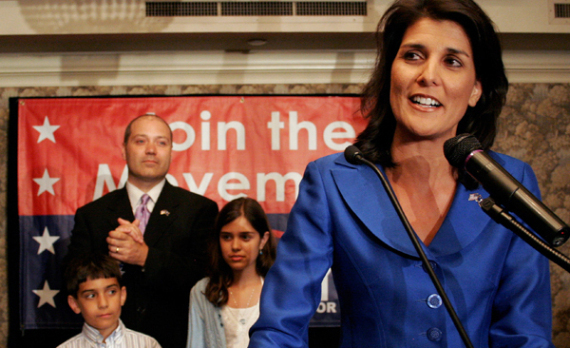Share this
From American Medical News:
 Gov. Nikki Haley’s email influence flap sheds light on the struggle of states that don’t want to implement reform themselves but don’t want federal intervention.
Gov. Nikki Haley’s email influence flap sheds light on the struggle of states that don’t want to implement reform themselves but don’t want federal intervention.
By Doug Trapp
Jan. 9, 2012
A South Carolina state commission concluded in late 2011 that neither a state nor a federal health insurance exchange is feasible, mirroring the position pushed by South Carolina Gov. Nikki Haley before she created the commission. The panel instead called for a private insurance marketplace to be run by health plans and modeled on travel search engines.
State leaders around the nation are vigorously debating whether to implement state health insurance exchanges as outlined in the national health system reform law, or to allow a federal health exchange. Both would provide a marketplace for new individual and small group health insurance and coordinate Medicaid enrollment. The health reform law requires either a state or federal exchange to be implemented, although states later can take over a federal exchange.
But some state leaders are concerned that cooperating with the federal government could come with high costs. So far, 13 states have enacted legislation to create exchanges, according to the National Conference of State Legislatures.
Some states have sent mixed signals on the national reform law. A majority of states have accepted at least one federal grant to help pay for exploring the feasibility of a health insurance exchange, but several of these states at the same time are suing the federal government to block implementation of the law.
South Carolina is one of these states. In late 2010, the state’s Dept. of Insurance accepted a $1 million federal exchange planning grant — requested by then-Gov. Mark Sanford’s administration in August 2010 — while the state pursued a joint lawsuit to block the health reform law.
Haley, a first-term Republican governor, pushed to avoid implementing either a state or a federal health exchange. This would limit the appearance that her administration was allowing the Democratic-supported health reform law to move forward in her state, according to emails provided in December 2011 by the South Carolina Dept. of Health and Human Services to The Post and Courier of Charleston.
Haley issued an executive order on March 10, 2011, creating a committee to study the feasibility of health insurance exchanges. “The whole point of this commission should be to figure out how to opt out and how to avoid a federal takeover, NOT create a state exchange,” she wrote in a March 31, 2011, email to her staff and Anthony Keck, director of the South Carolina health department.
Haley appointed five of the 12 members of the exchange planning committee and designated three others to serve — including Keck — because of their positions in her administration. The remaining four members were appointed by the leaders of the South Carolina House and Senate.
A third exchange option
Haley’s office directed questions about the exchange committee’s deliberations to Keck, who said the panel was not unduly influenced by Haley or anyone else. “Everyone came to the table with an opinion,” he said. “I don’t think there’s anyone who could say that all of the opinions didn’t get a fair hearing.” More than 40 people served on the committee and its four subcommittees, he said.
Some exchange commission members said they were disappointed in Haley’s hard-line position on health exchanges. But they also said the panel’s final report reflects the committee’s deliberations during more than 30 meetings, not influence from Haley, who they said did not contact any of them directly.
The commission concluded in November 2011 that the state was not able to create its own exchange under the deadlines imposed by the national health reform law. The panel also recommended the creation of a private health insurance exchange modeled on travel search engines at no direct cost to the state, among other recommendations. Such a private exchange would not handle Medicaid enrollment.
Everyone on the exchange committee knew that Haley opposed the national health reform law, said commission member Casey Fitts, MD, a general surgeon in Charleston. “This was something that was openly discussed throughout the process.” Dr. Fitts was appointed by South Carolina Senate President Glenn McConnell.
Dr. Fitts said he preferred a state exchange when he joined the committee. He changed his mind during the process because he came to believe that the state could not afford to create its own exchange, not because of any outside pressure.
He said he doesn’t fault Haley for favoring a private-sector health exchange, but he said she has sent mixed messages on the type of exchange she would support. “How she’s handled this and what she’s done has been very frustrating to me.”
State Sen. Mike Rose — also appointed by McConnell — said he wasn’t aware that Haley had made up her mind on exchanges and had pressured her Cabinet to fall in line behind that position. “That’s not what I would have preferred,” Rose said.
He said many of the tasks designated for health exchanges will require help from the federal government, including verifying individuals’ incomes and enforcing tax penalties. This raises questions about how much flexibility states really have regarding exchanges. Also, the state has had numerous problems with its child support payments registry, which is one of the reasons Rose said he favors a private exchange that compares only private insurance premiums.
“Our state’s not competent enough to do it,” Rose said. “If the federal government wants to take it over, that’s their prerogative.”
Tim Ervolina, president of the United Way Assn. of South Carolina, said he thought Haley had influence on the commission because she created it. But he didn’t think she directed the committee’s debate or its final report.
“Our recommendations were not political,” said Ervolina, who was appointed by Haley and described himself as politically liberal. He still believes the state should have a federal exchange, but that wasn’t the panel’s consensus.
The South Carolina Medical Assn. agreed with the exchange committee’s recommendations, said Gregory Tarasidis, MD, past SCMA president, who served on an exchange panel subcommittee.
Haley, Keck and the other exchange committee members said they are waiting for a federal response to the committee’s private exchange idea.
Exchange concept could prove popular
Several other states explicitly have declined to implement a state health insurance exchange as envisioned by the health reform law, or are unlikely to do so before the January 2013 certification deadline. These include Florida, Kansas, Louisiana, New Hampshire and Oklahoma, all of which returned at least part of their federal exchange planning grants, said Martha Salazar, a policy associate at the National Conference of State Legislatures.
However, those decisions may prove unpopular. Nearly 80% of Americans have a very or somewhat favorable view of the creation of “health insurance exchanges or marketplaces where small businesses and people who don’t get coverage through their employers can shop for insurance and compare prices and benefits.” This is according to the Kaiser Family Foundation’s December Health Tracking Poll. Exchanges are backed by 92% of Democrats, 75% of independents and 62% of Republicans.
Haley has declined to pursue additional federal exchange planning grants. South Carolina spent $291,000 of its initial $1 million exchange planning grant on the committee work.
Federal Dept. of Health and Human Services spokesman Bennett Blodgett did not say whether HHS would try to recover the grant funds spent by South Carolina. But he said that if states choose not to create their own exchanges, residents of those states would be able to access a federally facilitated exchange.
Share this
Contact Us
Have questions? Send us a private message using the form below.

